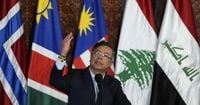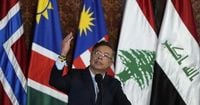Colombian President Gustavo Petro arrived in Port-au-Prince, Haiti, on Friday, July 18, 2025, marking his second visit to the Caribbean nation this year amid escalating gang violence and political instability. The visit underscores Colombia's commitment to supporting Haiti's fragile peace and security situation, as the capital city remains largely under gang control.
Petro's arrival in Haiti comes at a critical time. According to recent United Nations reports, at least 4,864 people have been killed across Haiti from October 2024 through June 2025, with hundreds more kidnapped, raped, or trafficked. The violence has displaced approximately 1.3 million people, devastating communities and overwhelming the already fragile state infrastructure. Port-au-Prince itself is under the control of gangs in about 90% of its territory, while surrounding towns in Haiti’s central region have been razed or seized by armed groups.
During his visit, President Petro announced the opening of a Colombian embassy in Haiti, a significant diplomatic step aimed at strengthening bilateral relations. He pledged to help Haiti bolster its security forces, a commitment that includes training Haitian officers. Haitian delegations have already visited a Colombian state-owned arms manufacturing company to learn about defense capabilities, signaling deepening cooperation between the two countries.
Petro met with Haiti’s prime minister and members of the transitional presidential council, which faces mounting pressure to hold general elections before February 2026. These discussions reportedly covered a range of bilateral projects focusing on security, commerce, education, agriculture, and combating drug trafficking. The visit also included a bilateral Cabinet meeting where both governments explored joint initiatives related to development and migration, along with signing new cooperation agreements targeting institutional support, public health, and sustainable development.
Accompanied by Colombian Defense Minister Pedro Sánchez and other officials, Petro's delegation arrived less than a week after Haitian authorities seized more than 2,300 pounds (1,000 kilograms) of cocaine off the country’s north coast and killed four suspected drug traffickers. This seizure was remarkable given the Haitian National Police's chronic understaffing and underfunding. The police force continues to operate alongside Kenyan police, who lead a U.N.-backed mission aimed at quelling the surging gang violence.
The timing of Petro’s visit is symbolically significant, arriving just two days before Colombia’s Independence Day on July 20. The president assured Colombians he would return promptly to fulfill his national duties but emphasized the historical ties between the two nations. “I want Colombia to help bring peace to Haiti for one fundamental reason: it was Haiti that set the first ships, the first men, and the first weapons so that Colombia could gain independence from the Spanish,” Petro declared.
This historical connection forms the backbone of Colombia’s renewed commitment to Haiti. Petro’s administration views the visit as both a gesture of solidarity and a strategic move to project Colombia’s growing role in regional diplomacy. Haiti’s ongoing crisis, marked by deteriorating security and humanitarian conditions, poses concerns that ripple beyond the Caribbean, affecting the broader hemisphere.
Yet, Petro’s foreign focus has drawn criticism at home. Many Colombians question why their president is prioritizing peacebuilding efforts abroad when Colombia itself grapples with unresolved internal conflicts. Petro campaigned on a promise of “Total Peace” for Colombia, but progress has been uneven. Negotiations with armed groups such as the ELN and dissident factions of FARC have yielded mixed results, with ceasefires frequently violated. Meanwhile, rural violence, social unrest, and political polarization continue to complicate Colombia’s peace agenda.
Despite these challenges, Petro’s administration is leveraging Colombia’s experience in transitional justice and demobilization, areas in which the country has gained international recognition since the 2016 peace accords with FARC. This expertise may prove valuable in supporting multilateral stabilization efforts in Haiti.
Another sensitive issue discussed during the visit involves the ongoing investigations into the assassination of Haiti’s late President Jovenel Moïse in July 2021. Seventeen former Colombian soldiers are accused of involvement in the killing, and Haitian judges continue to interrogate them. The Colombian government has pledged to seek their release or at least improve their harsh prison conditions. This case remains a significant point of tension between the two countries and adds complexity to Colombia’s diplomatic engagement.
Petro’s first visit to Haiti earlier this year, in January 2025, was met with much fanfare in the southern coastal city of Jacmel. Haitian officials had invested approximately $3.8 million to expand the airport runway, renovate the town, and restore electricity to a population that had lived in darkness for at least three years. This time, Petro landed in Port-au-Prince, where the security situation is far more precarious.
The visit was not without controversy. A planned press conference was canceled after reporters waited for several hours, and a small group of Haitians protested outside the new Colombian embassy. One protester poignantly remarked, “We had a president. They killed him,” referencing the assassinated Moïse and the Colombian suspects. These tensions highlight the delicate balance Colombia must maintain in its efforts to assist Haiti while addressing local sensitivities.
Petro’s frequent international travels have also sparked debate in Colombia. A report by the national newspaper El Colombiano revealed that over two years, Petro has undertaken 40 foreign trips costing approximately 7.87 billion Colombian pesos (around US$2 million). Critics argue that such expenditures are ill-timed given Colombia’s domestic challenges.
Nevertheless, Petro’s visit to Haiti reflects a broader vision of regional cooperation and peacebuilding. By supporting Haiti’s security and development, Colombia aims to play a constructive role beyond its borders, reaffirming a legacy of solidarity rooted in shared history. Whether this approach will yield tangible improvements in Haiti’s crisis or bolster Colombia’s international standing remains to be seen. For now, the stakes are high, and the eyes of both nations are watching closely.


